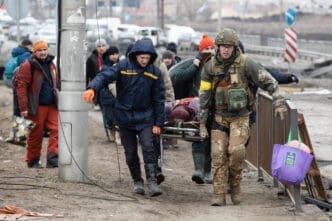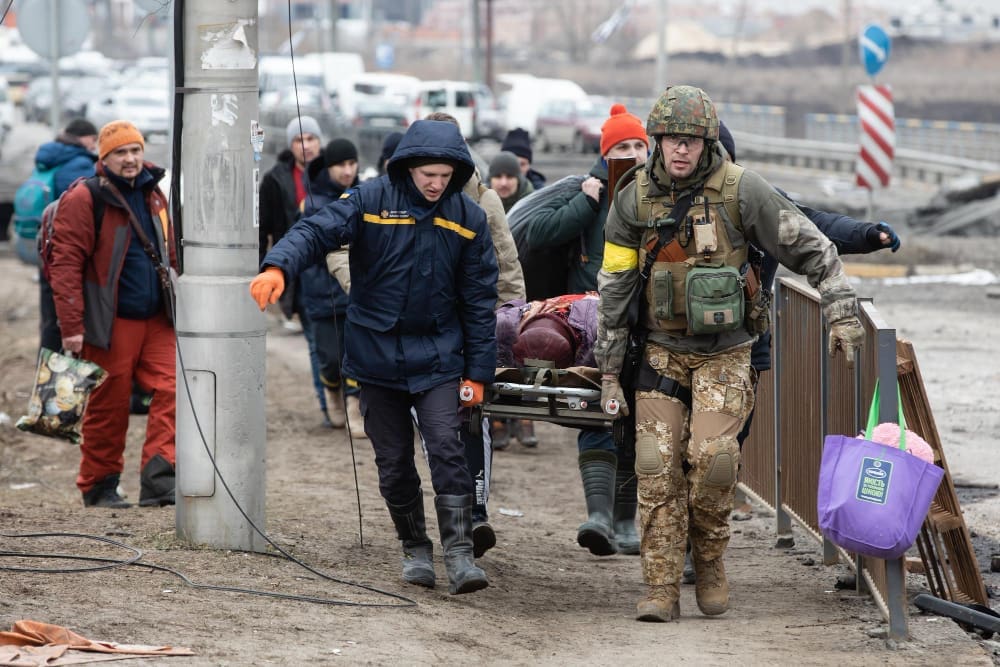Executive Summary
- US President Trump and Russian President Putin met for negotiations in Alaska, excluding Ukrainian President Volodymyr Zelensky, which sparked deep concern and frustration in Ukraine.
- Ukrainians harbored deep apprehension about the closed-door talks, fearing potential demands for territorial concessions and distrusting any agreements made without their direct involvement, given widespread distrust of Putin and Trump’s unpredictability.
- While 75% of Ukrainians oppose formally ceding territory, polls show approximately 54% might support some land compromise to end the war if accompanied by robust international security guarantees, though many fear Russia would exploit such a freeze to rearm and reattack.
The Story So Far
- The ongoing conflict between Ukraine and Russia has put Ukraine’s territorial integrity at risk, with discussions of potential “land swaps” and formal annexation of Ukrainian regions being highly contentious.Ukrainians harbor deep distrust of Russian President Vladimir Putin and are apprehensive that agreements could be made without their direct involvement, particularly given earlier suggestions of territorial concessions.Concerns are amplified by US President Donald Trump’s perceived unpredictability and his desire to secure a deal, leading to fears he might make private advance agreements with Russia without Ukraine’s consent.
Why This Matters
- Ukrainian officials and leadership expressed deep concern and viewed their exclusion from the US-Russia talks as a “great injustice,” fearing that President Trump’s desire for a deal could lead to private advance agreements or pressure for territorial concessions without Ukraine’s consent.
- The majority of Ukrainian citizens exhibit profound distrust of Russia and overwhelmingly oppose formally ceding any territory, believing that freezing frontlines without robust international security guarantees would merely allow Russia to regroup for future attacks.
- A segment of war-weary Ukrainians, particularly those from affected regions, expressed a willingness to consider difficult compromises on land to end the war and save lives, prioritizing peace by “any means necessary” due to the prolonged conflict and immense casualties.
Who Thinks What?
- Ukraine’s exclusion from critical US-Russia talks about its future has ignited deep apprehension, as the possibility of “land swaps” or a frozen conflict without its consent threatens its sovereignty. This lack of direct representation, amid widespread distrust of Russia, could lead to an internationally imposed solution that many Ukrainians fear would only enable future Russian aggression, rather than secure lasting peace.
Ukrainians expressed deep concern and frustration on Friday as US President Donald Trump and Russian President Vladimir Putin met for negotiations in Alaska, talks from which Ukrainian President Volodymyr Zelensky was notably excluded. The closed-door discussions sparked apprehension in Ukraine, particularly due to earlier signals from Trump suggesting “land swaps” could be on the table, interpreted by many as a potential demand for Ukrainian territorial concessions to Russia.
Ukrainian Apprehension and Distrust
The prospect of these negotiations, held thousands of miles away without Ukrainian representation, has fostered a mix of deep skepticism and profound fatigue within Ukraine. Polling consistently indicates that approximately 95% of the Ukrainian population distrusts Putin, amplifying anxieties about any potential agreements made without their direct involvement.
Tetyana Bessonova, 30, from Pokrovsk, an eastern city near the frontlines, articulated the personal impact of these discussions. She highlighted that her hometown’s future is directly at stake if land were to be surrendered, questioning whether she and many others would ever be able to return to their homeland.
Diplomatic Context and Concerns
French President Emmanuel Macron had previously stated that Trump agreed no territorial concessions would be made without Ukraine’s approval. Additionally, Trump has indicated an intention to hold a second summit with Zelensky present before any final agreements. However, Trump’s perceived unpredictability fuels distrust in Ukraine, with many fearing he could be swayed by Putin during a one-on-one meeting.
Oleksandr Merezhko, a Ukrainian MP and chair of the country’s parliamentary committee on foreign affairs, emphasized the inherent danger of the closed-door meeting for Ukraine. Merezhko expressed fears that Trump’s desire to be seen as a dealmaker might lead him to make private advance agreements with the Russians to avoid embarrassment if no visible progress is achieved.
Potential Outcomes and Public Opinion
Various possibilities for a ceasefire have been discussed, ranging from freezing the current frontlines without formally recognizing seized territory as Russian, to Russia annexing four entire regions in eastern and southern Ukraine. These discussions are deeply painful for those from affected regions.
Polls conducted by the Kyiv International Institute of Sociology suggest that approximately 54% of Ukrainians might support some form of land compromise to hasten the war’s end, but only if accompanied by robust security guarantees from international partners. However, widespread distrust of Russia leads many to believe that freezing frontlines without such guarantees would merely allow Russia to regroup and reattack.
Volodymyr, a Ukrainian sniper, underscored this sentiment, stating that a frontline freeze and territorial concessions would only serve as a platform for a new Russian offensive. He emphasized the sacrifices made by soldiers for these territories and warned that such a move could ultimately lead to the collapse of the country.
Anton Grushetsky, director of the Kyiv International Institute of Sociology, noted the difficult decisions Ukrainians face regarding their future, including the potential de facto control of 20% of their land by Russia. Despite this, he observed a degree of flexibility among Ukrainians regarding security guarantees.
While 75% of Ukrainians are entirely opposed to formally ceding any territory to Russia, the remaining 25% includes some who are pro-Russian or simply so war-weary that they believe hard compromises are necessary. Luibov Nazarenko, 70, a retired factory worker from the Donetsk region, voiced a common desire to stop the war by any means necessary, prioritizing the preservation of lives over land, especially after years of conflict and immense casualties.
Spiritual Reflection Amidst Uncertainty
As the talks commenced on Friday, Ukrainians observed the holy day of the Assumption of the Blessed Virgin Mary, a day believed to be when prayers are heard. Priest Oleksandr Beskrovniy described the exclusion of Zelensky from the talks as a “great injustice and madness.”
While acknowledging Ukraine’s inability to recapture all stolen territory by force, Beskrovniy emphasized that any deal should prioritize people over land. He prayed for Ukraine’s future strength, both on the frontlines and in the diplomatic arena, without directly naming the Alaska talks.














